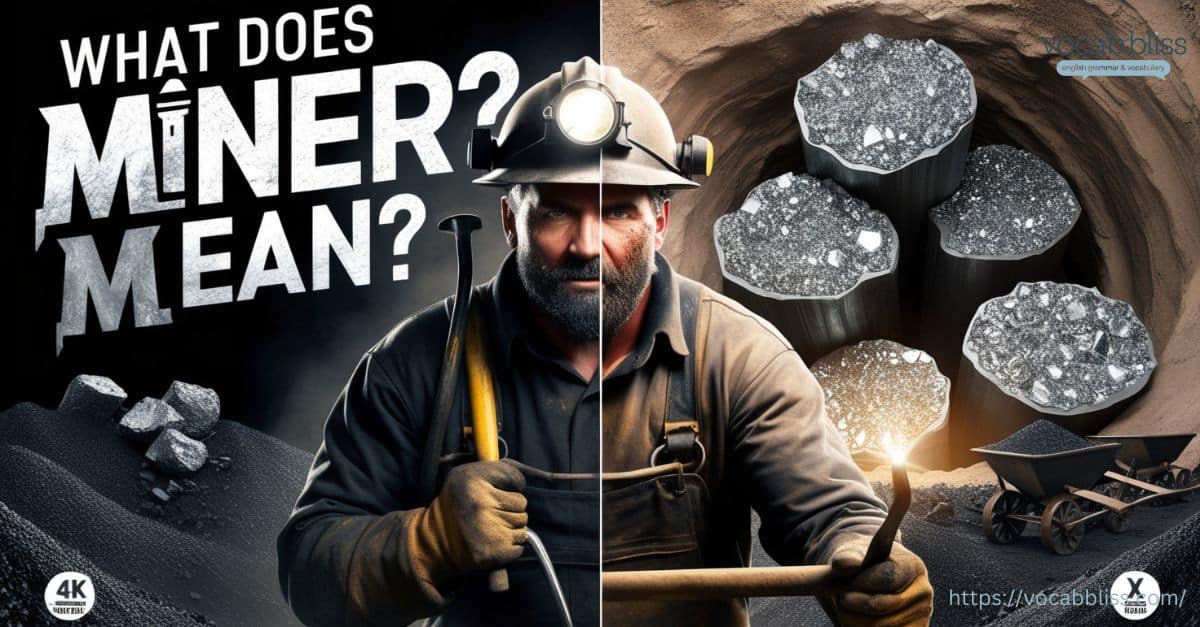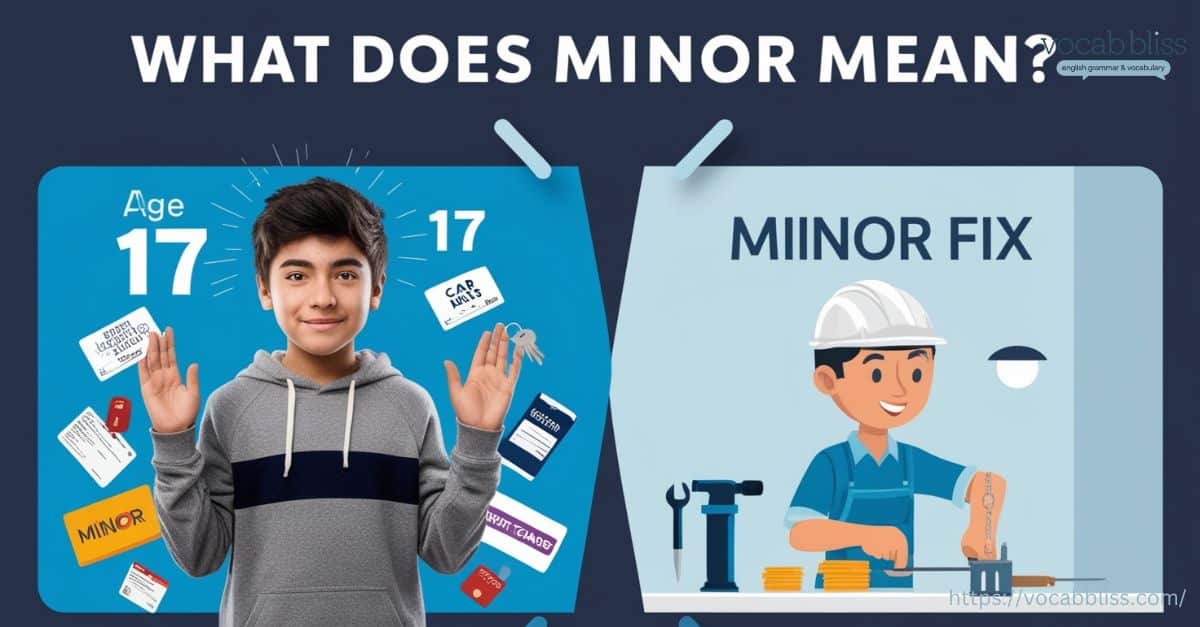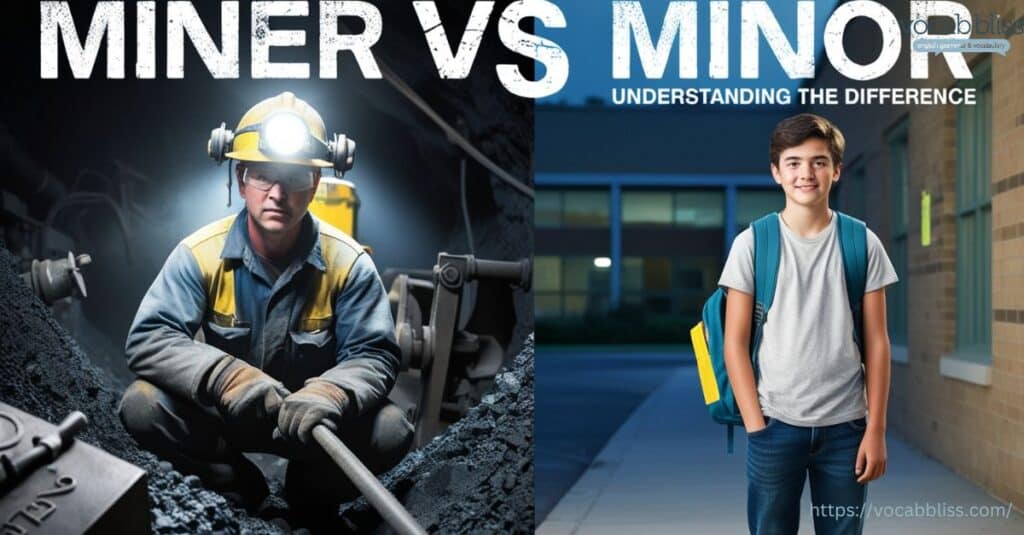The English language can be tricky, especially when it comes to homophones—words that sound the same but differ in meaning and spelling. Among the most commonly confused homophones are miner vs minor.
Minor miner these words may look similar and even sound identical, but their meanings are worlds apart. Let’s explore the difference between miner or minor, understand their proper usage, and uncover their unique roles in language and life.
Quick Summary
The words miner vs minor are homophones, meaning they sound identical but differ significantly in meaning, spelling, and usage. A miner is always a noun and refers to someone who works in mining, extracting valuable resources like coal, gold, or minerals. In contrast, minor can be both a noun and an adjective, referring to a person under the legal age of adulthood or something of lesser importance, respectively. While their identical pronunciation often causes confusion, understanding their distinct roles and contexts helps prevent common errors. Whether discussing mining operations or legal definitions, choosing the correct term ensures clear and accurate communication.
Continue reading: Set or Sit: When and where to Used?
What Does Miner Mean?

Definition and Part of Speech
The word miner is a noun, referring to an individual whose primary occupation involves extracting minerals, ores, or other valuable resources from the earth. This profession plays a vital role in industries such as energy, construction, and technology, as it provides raw materials like coal, gold, and rare earth elements.
The term derives from the word “mine,” which signifies a location where such resources are excavated. A miner can work in various settings, from underground tunnels to open-pit mines, and may use manual tools or advanced machinery depending on the scale and nature of the operation.
Examples of Miner in Context
Here are a few examples to clarify the meaning of miner:
- A coal miner spends hours underground, carefully extracting resources that power homes and industries.
- During the California Gold Rush, thousands of miners flocked westward, hoping to discover fortune in the rivers and hills.
- Modern-day miners often rely on automated machinery and data-driven methods to locate and extract precious minerals like lithium.
How to Use Miner in a Sentence
Miner can be used in both straightforward and complex sentences, depending on the context:
- Simple: The miner descended into the mine with his tools at dawn.
- Complex: Equipped with state-of-the-art drilling equipment, the experienced miner navigated the narrow tunnels to extract copper ore safely.
In each case, miner clearly indicates a person involved in the mining profession.
Common Misunderstandings of Miner
The term miner is frequently confused with minor due to their identical pronunciation. Here are some clarifications to avoid common pitfalls:
- Incorrect: “The miner is underage and cannot sign a legal contract.”
Correct: “The minor is underage and cannot sign a legal contract.” - Incorrect: “A gold minor works tirelessly in search of fortune.”
Correct: “A gold miner works tirelessly in search of fortune.”
What Does Minor Mean?

Definition and Part of Speech
The word minor serves as both an adjective and a noun, making it highly versatile in the English language.
- As an adjective, minor describes something of lesser importance, size, or degree. It often contrasts with “major” and is used in various contexts, including music, legal terms, and general comparisons. For instance, a minor injury is less severe than a major one.
- As a noun, minor typically refers to an individual under the age of legal adulthood. The legal definition of minor varies by jurisdiction but generally applies to those under 18 or 21 years old, depending on the country’s laws.
Examples of Minor in Context
Here are some examples to highlight the multiple uses of minor:
- Adjective:
- The car suffered only minor damage during the storm.
- In music theory, the A minor scale is a popular choice for emotional compositions.
- Noun:
- By law, a minor cannot enter into binding contracts without parental consent.
- The university requires students to declare a minor in a secondary field of study.
How to Use Minor in a Sentence
The usage of minor varies based on context. Below are examples illustrating its flexibility:
- Casual Context:
- Adjective: Don’t worry; it’s just a minor scratch on the surface.
- Noun: As a minor, she needed her parents’ permission to attend the event.
- Formal Context:
- Adjective: The committee addressed minor discrepancies in the financial report during their meeting.
- Noun: Under the legal framework, a minor cannot be held accountable for contractual obligations in the same way as an adult.
Common Misunderstandings of Minor
Given its varied meanings, minor is sometimes misused in ways that lead to confusion. Here are a few examples of incorrect usage and their corrections:
- Incorrect: “He played a minor role in the coal mine operation.”
Correct: “He played a minor role in the decision-making process.”
(Minor is better suited here to describe a lesser role in importance, not mining.) - Incorrect: “The minor received his paycheck after working a shift underground.”
Correct: “The miner received his paycheck after working a shift underground.”
Misunderstandings often arise from the homophonic similarity between miner vs minor, making it important to carefully consider context and spelling.
Miner vs Minor: Key Differences
Definitions and Pronunciation
At first glance, miner vs minor sound identical, leading to confusion. Both words are homophones, meaning they share pronunciation but differ in spelling and meaning.
- Miner: Refers to a person who works in mines, extracting minerals or resources. Pronounced /ˈmaɪ-nər/.
- Minor: Has two primary meanings. As a noun, it refers to someone under the legal age of adulthood. As an adjective, it signifies something of lesser importance or degree. Pronounced /ˈmaɪ-nər/ (identical to “miner”).
Grammatical Differences
The grammatical roles of these words are distinct:
- Miner: Always a noun, as it describes a person engaged in mining activities. For example, “The miner worked long hours underground.”
- Minor: Functions as both an adjective and a noun.
- As an adjective: “The issue was minor, so it didn’t require urgent attention.”
- As a noun: “The minor couldn’t legally sign the contract.”
Understanding their grammatical functions is crucial to using them correctly in sentences.
Visual and Phonetic Differences of minor miner
The table below highlights the key distinctions between miner vs minor:
| Aspect | Miner | Minor |
|---|---|---|
| Part of Speech | Noun | Adjective, Noun |
| Definition | A person who works in a mine | Noun: Underage person; Adjective: Lesser importance |
| Pronunciation | /ˈmaɪ-nər/ | /ˈmaɪ-nər/ |
| Usage Examples | “The miner extracted coal from the seam.” | “The minor required parental consent.” |
| Spelling | Ends with -er | Ends with -or |
This comparison emphasizes that while the words sound the same, their meanings, grammatical roles, and contexts of use are fundamentally different.
Miner vs Minor in Context

Everyday Usage Scenarios
The words miner vs minor are used in distinct contexts, reflecting their unique meanings. Below are examples of how each word fits into real-life scenarios:
- Miner:
- A coal miner works underground, extracting resources to fuel industries and homes.
- Gold miners during the 19th century Gold Rush endured harsh conditions in their search for wealth.
- Modern miners often rely on advanced technology to locate and safely extract valuable minerals like lithium for electric vehicles.
- Minor:
- As a Noun:
- A minor cannot vote or purchase alcohol due to age restrictions.
- In most legal systems, a minor requires a guardian’s consent to participate in contracts or legal agreements.
- As an Adjective:
- The project encountered only minor delays, which didn’t affect the overall timeline.
- In music, compositions in a minor key often evoke feelings of sadness or melancholy.
- As a Noun:
These scenarios highlight the distinct, non-overlapping use of miner vs minor in daily life.
Contextual Missteps to Avoid
Confusion between minor vs miner often arises due to their identical pronunciation. Missteps are common when written communication lacks clarity. Below are some situations to watch out for:
- Workplace Contexts:
- Incorrect: “The gold minor struck a rich vein during excavation.”
- Correct: “The gold miner struck a rich vein during excavation.”
- Legal or Age-Related Contexts:
- Incorrect: “A miner cannot legally sign a contract without parental consent.”
- Correct: “A minor cannot legally sign a contract without parental consent.”
- Academic and Musical Contexts:
- Incorrect: “In music, the A miner scale is popular for its emotional depth.”
- Correct: “In music, the A minor scale is popular for its emotional depth.”
Tips to Avoid Confusion
- Verify the Context: Is the subject related to mining or age/importance? This determines whether to use miner or minor.
- Remember the Ending:
- -er for mining professionals.
- -or for age or level of significance.
- Practice with Examples: Create your own sentences using miner and minor to reinforce understanding.
Side-by-Side Comparison Table
Here’s a concise table outlining the key aspects of minor vs miner to clarify their differences at a glance:
| Aspect | Miner | Minor |
|---|---|---|
| Meaning | A person who extracts minerals from the earth | Noun: A person under legal adulthood; Adjective: Lesser in importance or degree |
| Part of Speech | Noun | Noun, Adjective |
| Pronunciation | /ˈmaɪ-nər/ | /ˈmaɪ-nər/ |
| Spelling | Ends with -er | Ends with -or |
| Usage Example | “The miner discovered a rich vein of gold.” | Noun: “The minor needs parental consent.” Adjective: “The error was minor and easily fixed.” |
| Context | Related to mining and resource extraction | Related to age (legal definition) or significance (comparison) |
| Homophone Confusion | Sounds identical to “minor” | Sounds identical to “miner” |
| Associated Topics | Mining, minerals, geology, safety regulations | Legal age, music scales, importance, education |
This table serves as a quick reference to distinguish minor vs miner, focusing on their unique roles, meanings, and usage contexts.
Conclusion
The difference between miner or minor lies in their meanings and applications. A miner digs into the earth for resources, while a minor is a legal term or descriptor for something insignificant. Knowing when to use minor or miner correctly can save you from embarrassing mix-ups in both casual and professional settings. Next time you’re unsure, remember this guide, and you’ll master the difference between miner and minor in no time!
FAQs about Miner vs Minor
- What is a miner in age?
A miner is not related to age. If you’re referring to someone under the legal age of adulthood, the correct word is minor.
- Is it miner or minor?
It depends on the context. Use miner for mining activities and minor for age or lesser significance.
- What does a miner do for work?
A miner works in extracting valuable materials like coal, gold, or other minerals from the earth.
- Are miner and minor similar or contradictory?
They are homophones with vastly different meanings. While they sound alike, their usage is entirely distinct. - Miner minor the meanings of these words are?
The words miner refers to a person who works in mining, and minor refers to someone under legal age or something of lesser importance.
- What is the meaning of the homophones miner and minor?
- Miner: A profession focused on mining.
- Minor: Refers to legal age or something of lesser importance.







